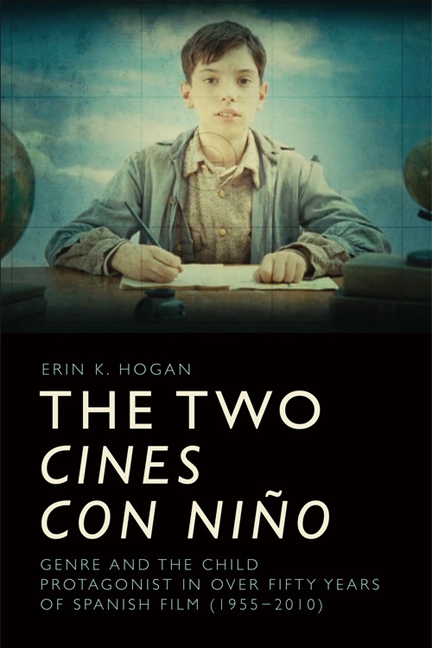Book contents
- Frontmatter
- Contents
- List of Figures
- Acknowledgements
- Figure Permissions
- Introduction The Two Cines Con Niño: The Ventriloquism, Dialogism and Biopolitics of the Children of Franco in Genre Film
- 1 The Black Market and the Stolen Children of Franco in Demonios En El Jardín
- 2 The Appropriative and Carnivalesque Ventriloquism of Altar Boys from Joselito in El pequeño ruiseñor to Ignacio in La mala Educación
- 3 Ventriloquism, Kidnapping and the Carnivalesque in Marisol’s Tómbola
- 4 Adopting, Adapting and Appropriating in the cines con niño: Un rayo de luz and El viaje de Carol
- 5 Prosopopeia and the Gothic Child from Marcelino pan y vino to El Orfanato
- 6 Dialogism and Ritual Function of the Nuevo Cine Con Niño: El Espíritu De La Colmena, Secretos Del Corazón And El Laberinto Del Fauno
- 7 Queering Post-war Childhood in Urte Ilunak and Pa Negre
- 8 The Transatlantic Dialogism in Narrative and Aesthetics of Bildungsfilms: La Lengua De Las Mariposas, Machuca, El Espíritu De La Colmena, El Premio, El Laberinto Del Fauno And Infancia Clandestina
- Conclusion Spanish Movies: Genre, Nation and Spanish Movie
- Select Filmography
- Select Bibliography
- Index
2 - The Appropriative and Carnivalesque Ventriloquism of Altar Boys from Joselito in El pequeño ruiseñor to Ignacio in La mala Educación
Published online by Cambridge University Press: 01 May 2021
- Frontmatter
- Contents
- List of Figures
- Acknowledgements
- Figure Permissions
- Introduction The Two Cines Con Niño: The Ventriloquism, Dialogism and Biopolitics of the Children of Franco in Genre Film
- 1 The Black Market and the Stolen Children of Franco in Demonios En El Jardín
- 2 The Appropriative and Carnivalesque Ventriloquism of Altar Boys from Joselito in El pequeño ruiseñor to Ignacio in La mala Educación
- 3 Ventriloquism, Kidnapping and the Carnivalesque in Marisol’s Tómbola
- 4 Adopting, Adapting and Appropriating in the cines con niño: Un rayo de luz and El viaje de Carol
- 5 Prosopopeia and the Gothic Child from Marcelino pan y vino to El Orfanato
- 6 Dialogism and Ritual Function of the Nuevo Cine Con Niño: El Espíritu De La Colmena, Secretos Del Corazón And El Laberinto Del Fauno
- 7 Queering Post-war Childhood in Urte Ilunak and Pa Negre
- 8 The Transatlantic Dialogism in Narrative and Aesthetics of Bildungsfilms: La Lengua De Las Mariposas, Machuca, El Espíritu De La Colmena, El Premio, El Laberinto Del Fauno And Infancia Clandestina
- Conclusion Spanish Movies: Genre, Nation and Spanish Movie
- Select Filmography
- Select Bibliography
- Index
Summary
Introduction
Spanish star director and Academy award-winning filmmaker Pedro Almodóvar makes his contribution to the nuevo cine con niño with La mala educación (Bad Education) (2004). Dialogism abounds across La mala educación, most importantly with the cine con niño's El pequeño ruiseñor (The Little Nightingale) (Lucía 1956), and with Almodóvar's greater oeuvre, ¿Qué he hecho yo para merecer esto! (What Have I Done to Deserve This! (1984) and La ley del deseo (Law of Desire) (1987). Spanish cinema, Sara Montiel's Mi último tango (My Last Tango) (Amadori 1960), and Spanish theatrical arts, Federico García Lorca's Retablillo de Don Cristóbal (The Little Puppet Show of Don Cristóbal) (1931), also infuse Almodóvar's film. My analysis will examine the unexplored dialogism of popular cinema and theatre that is implicit and explicit in La mala educación. I argue that symbolism within and across El pequeño ruiseñor, Mi último tango, and Retablillo de Don Cristóbal converges upon the carnivalesque, puppetry, and violence. These interactions indicate the ventriloquism and the respective commercial or sexual exploitation of the altar boys Joselito (José Jiménez Fernández) and Ignacio Rodríguez (Ignacio Pérez). Following Mikhail Bakhtin's theories, I will examine how Almodóvar re-accentuates the monetary exploitation of Joselito's golden voice by the town's sexton Mr Martín (Mariano Azaña) in Lucía's film as the sexual appropriation of Ignacio's voice and docile body by Father Manolo (Daniel Giménez Cacho).
The action of La mala educación occurs at a boys’ Catholic boarding school in 1964, in Valencia in 1977, and in Madrid and Galicia in the early 1980s. The feature is a labyrinthine film-within-a-film, whereby La mala educación encompasses ‘The Visit’ and both stories are seasoned with multiple impersonations and acts of ventriloquism. Juan (Gael García Bernal) kills his brother Ignacio (Francisco Boira), a transsexual junkie who had been sexually abused in primary school, out of self-interest and of his shame of Ignacio's difference. Mr Berenguer (Lluís Homar), formerly Father Manolo (Daniel Giménez Cacho), exchanges gifts for sexual favours with Juan and aids him in killing Ignacio, who is blackmailing Mr Berenguer in 1977 for money to complete his sex change. Ignacio threatens to publish ‘The Visit’, his tale of the sexual abuse he suffered at Father Manolo's hands. Meanwhile, Juan passes for his brother to pitch ‘The Visit’ to filmmaker Enrique Goded (Fele Martínez), who was Ignacio's first love at school.
- Type
- Chapter
- Information
- The Two cines con niñoGenre and the Child Protagonist in Fifty Years of Spanish Film (1955–2010), pp. 39 - 63Publisher: Edinburgh University PressPrint publication year: 2018



